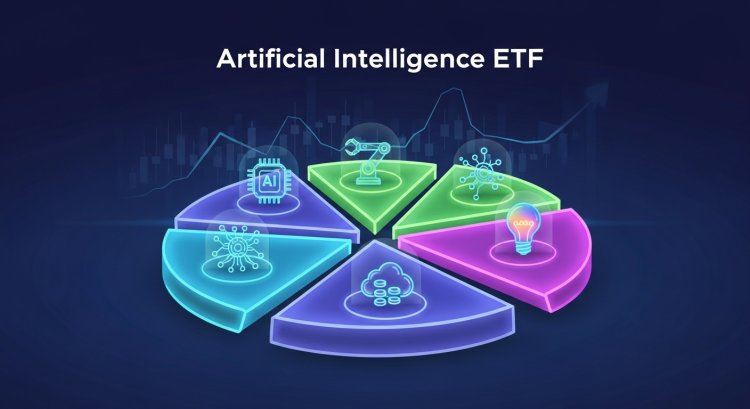Top Reasons to Invest in Artificial Intelligence ETFs Right Now
Explore the rise of Artificial Intelligence ETFs, real-world AI applications, and how to invest in the booming AI sector with confidence.

Let's face it: Artificial Intelligence isn't just "the future" anymore — it's here, shaping everything from how doctors diagnose diseases to how Netflix decides what you'll binge next. Whether you're reading this on your smartphone or laptop or even hearing it through a voice assistant, chances are AI is involved.
So what does that mean for your portfolio? Enter the Artificial Intelligence ETF — a simple way to invest in the companies building tomorrow's tech, today.
Wait, What Exactly Is an Artificial Intelligence ETF?
An AI ETF (Exchange-Traded Fund) is like a curated playlist, but instead of music, it holds stocks of companies working in AI. This might include tech giants like NVIDIA or Google, and even smaller innovators in fields like healthcare, automation, robotics, or machine learning.
Rather than guessing which single AI stock will win big, an ETF gives you a diverse basket of companies — so your investment grows with the industry itself.
Why it's a smart move:
- Diversification: You're not putting all your eggs in one AI-shaped basket.
- Growth potential: AI is everywhere and still expanding.
- Less guesswork: You don't have to be a tech wizard to invest in the future.
How AI Is Already Changing the World
AI is no longer confined to labs or sci-fi movies. It's showing up in everyday life — often in ways you don't even notice.
A few places AI is quietly doing its thing:
- Healthcare: Helping doctors detect cancer earlier, predict patient risks, and speed up diagnoses.
- Finance: Catching fraud, automating trades, and managing risk.
- Retail: Powering those "you might also like…" recommendations.
- Customer Service: Chatbots that are smart enough actually to help.
- Education: Personalized learning based on how you learn best.
Heard of artificial humans or artificial windows? These are next-gen AI technologies making virtual worlds more real and realistic avatars possible in customer service or content creation.
Curious About Building AI Yourself?
So you're thinking, "How do I even build artificial intelligence?" The idea sounds futuristic, but getting started is more accessible than ever.
Here's what it takes:
- Pick a problem to solve (like detecting spam emails).
- Collect data (emails marked spam or not).
- Choose a model (this is where machine learning comes in).
- Train it using your data.
- Test and tweak until it gets smarter.
- Deploy it — make it available in an app or website.
Not a coder? No problem. There are loads of beginner-friendly Artificial Intelligence courses online (more on that below).
What Can AI Actually Do Right Now?
The short answer: a lot.
- Chat with humans (yep — like me!)
- Write blogs and emails
- Diagnose diseases
- Drive cars (not perfectly, but we're getting there)
- Power virtual assistants like Siri and Alexa
- Create music, art, and even clothing designs
And that's just scratching the surface. AI is learning to do more every single day.
Is AI a Good Thing?
It's a fair question, and there's no one-size-fits-all answer. Here's how I like to look at it:
The upside:
- Saves time and money
- Helps us make better decisions
- Takes on repetitive or dangerous tasks
- Can improve lives in healthcare, education, and more
The downside:
- Might replace some jobs
- Can inherit bias from data
- Raises concerns about privacy and misuse
Like any tool, AI depends on how we use it. The goal is to build and apply it responsibly — and that's something we all should be paying attention to.
Why More People Are Investing in AI ETFs
If you believe AI is going to be a major part of the future (and spoiler: it will be), then investing in the companies behind it makes sense.
Artificial Intelligence ETFs let you tap into that growth without needing to pick winners and losers.
You're investing in:
- The chips that power AI (hi, NVIDIA
- The cloud platforms that host AI tools
- The startups building tomorrow's game-changing AI tech
- The industries applying AI, from healthcare to self-driving cars
It's a way to invest in the future, without overcomplicating it.
Real Questions People Ask About Artificial Intelligence (Q&A)
Let's answer some of the most common — and most interesting — questions people ask about AI.
1. What are the 4 types of AI?
- Reactive Machines – Basic AI that reacts to current input (like a chess-playing computer).
- Limited Memory – Can use past data to make decisions (like self-driving cars).
- Theory of Mind – I am not here yet, but I would understand emotions and intent.
- Self-aware AI – Still theoretical… for now.
2. What's the best AI stock to buy?
Some solid picks include:
- NVIDIA (NVDA) – Big player in AI hardware.
- Alphabet (GOOGL) – Parent company of Google and DeepMind.
- Microsoft (MSFT) – Major AI investments and OpenAI partner.
- Amazon (AMZN) – Uses AI in logistics, Alexa, and cloud services.
Not sure where to start? AI ETFs are a beginner-friendly way to get in.
3. What is artificial intelligence (in plain English)?
Think of AI as software that learns how to do tasks we usually think require human smarts — like understanding language, recognizing images, or solving problems.
4. Which jobs are safe from AI?
Jobs that need:
- Creativity (writers, designers, musicians)
- Empathy (therapists, social workers)
- Manual dexterity (plumbers, electricians)
- Leadership and complex decisions (CEOs, strategists)
Basically, anything deeply human.
5. What's AI clothing?
Artificial intelligence clothing uses smart fabrics and sensors to track your health, adjust to the temperature, or even monitor posture. Think of it like a Fitbit... but in your shirt.
6. Can you give examples of AI in real life?
Absolutely:
- Netflix suggesting shows
- Siri answering your questions
- Google Maps rerouting based on traffic
- Chatbots on websites
- Self-driving features in cars
7. Where can I learn more about AI?
Try an online Artificial Intelligence course from:
- Coursera
- Udemy
- edX
- LinkedIn Learning
Plenty of beginner-friendly options are out there — no coding experience required.
8. Are there AI apps I can try?
Yes, and some are surprisingly useful:
- ChatGPT – Conversations, writing help, and more
- Replika – An AI companion
- Youper – Mental health support
- FaceApp – AI photo editing
9. What's the best definition of AI?
Simple version:
Artificial Intelligence is the ability of machines to perform tasks that typically require human intelligence.
10. What's an AI website?
Could be:
- A site about AI (like OpenAI.com or TowardsDataScience.com)
- A site that uses AI to function (like AI writing assistants, customer support bots, etc.)
And what are the different "types" of AI again?
Here's a quick list:
- Reactive Machines
- Limited Memory
- Theory of Mind
- Self-aware
- Narrow AI
- General AI
- Superintelligent AI
- Rule-based systems
- Data-driven AI
- Neural network-based AI
Final Thoughts
AI is no longer something on the horizon — it's already part of our lives. And whether you're curious about the tech or thinking about investing, now's a great time to get involved.
Want to learn? Try an artificial intelligence course.
Want to invest? Explore an AI ETF.
Just curious? Play with an AI chatbot or try an AI-powered app.
The point is — get started. Because the future is already here, and it's smarter than ever.
What's Your Reaction?

















